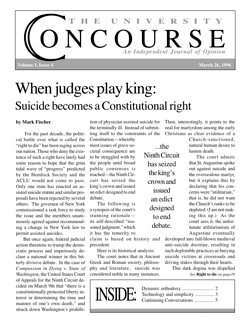How does a university evangelize?
by Kathleen van Schaijik
A few years back the term “dynamic orthodoxy” was adopted as a way of characterizing the distinctive ethos of Franciscan University. It tries to capture the unique spirituality of our campus life, without reducing it to its “charismatic” aspect. It likewise seeks to avoid the impression of the sort of rigid, backward-looking conservativism unfortunately often associated with the term “orthodox.” It emphasizes the fact that FUS is not merely orthodox, but vibrantly, powerfully so; that our doctrinal commitment is organically embedded in a total, lively and joyous life of Faith.
In such high and broad terms, the nature and mission of our University are endorsed by virtually all of our members. We agree that we should be orthodox, and dynamically so. But when we bring it down to the concrete, there is less perfect unanimity. There is, in fact, a lot of confusion and some fairly huge disagreement about how our commitment to “dynamic orthodoxy” should be played out in the practical realm. Some take it as a mandate for special emphasis on the charismatic renewal; others see it as implying nothing more than that our theology and spirituality should be authentically Catholic—just as they are at other orthodox colleges, like Christendom, Thomas Aquinas and Thomas More.
Perhaps in order to help fill out the meaning of the term, in the Fall of 1994, Ralph Martin (then a trustee of FUS) was asked to give a talk titled “Dynamic Orthodoxy” to the faculty here.
The talk, like a prophesy, was at once sobering and stirring. It is sobering to be made to face the spiritual plight of the Church—the millions of souls who have virtually no living knowledge of Christ; who, though they attend Mass and call themselves Catholics, seem to realize nothing personally of the gospel’s power to save. But at the same time, our hearts leap with hope and readiness when our attention is directed to the trumpet blast issuing from the Vatican—an urgent call for a new evangelization, “new in ardor, new in methods and new in expression.”
Mr. Martin pointed out that this call for a new evangelization has become a major theme of John Paul II’s pontificate, and he reminded us that the “supreme duty” of every Catholic institution is “to proclaim Christ.” The temptation (perhaps for universities in particular) is to forget this; to treat evangelization as something for Protestants or for missionaries only, or to reduce it to apologetics—i.e., the intellectual effort to persuade non-Catholics that our doctrines are true—rather than the joyful proclamation of the Good News of salvation.
He painted a bleak (but realistic) picture of the Church today, while at the same time acknowledging the signs of a “new Spring” everywhere appearing. He said: “we find at Franciscan Unversity a Spirit-led anticipation of and realization of” that new Spring. Under the inspiration of St. Francis and the leadership of Father Michael, the University has taken her duty to evangelize very seriously—as is dramatically evidenced in the intense religious life of her students and the phenomenal success of her outreach ministries. He urged us as a community not to let the gift slip; not to forget our extremely high calling; not to make the catastrophic mistake of glorifying self rather than God. It was very moving.
But there was one thing missing in his talk, which I would like to see addressed in future issues of the Concourse. In trying to show how FUS has responded to the Holy Father’s call for a new evangelization, Mr. Martin mentioned only households, Life in the Spirit seminars and Festivals of Praise. He said nothing about our specifically intellectual vocation—about how it is that a university, as a university, exercises its duty to spread the gospel.
Adam Tate’s letter in the Continuing Conversations section of this issue raises the problem of anti-intellectualism at FUS. I do not mean at all to accuse Ralph Martin of anti-intellectualism, but this omission in his talk could easily play into the hands of those who see the call to evangelization as a call to emphasize the spiritual as opposed to the academic—as if there were some real tension between the two; as if increasing our academic standards entailed a diminution of our spiritual fervor.
The life of the mind, too, must be redeemed. The University’s is first and foremost an intellectual apostolate.
Kathleen van Schaijik


